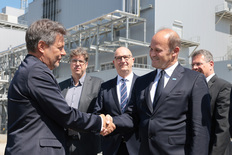- The European Battery Alliance has generated over €180 billion in private investments.
- The new black mass production facility is expected to start in 2024.
- The facility processes key metals like lithium, nickel, cobalt, and manganese.
- The project is part of the IPCEI approved by the European Commission in 2019.

Inauguration of Battery Materials and Recycling Center
BASF has opened Europe’s first co-located center for battery material production and recycling in Schwarzheide, Germany. This facility includes a state-of-the-art production plant for high-performance cathode active materials and a battery recycling plant for black mass production, aiming to close the loop in the European battery value chain.
Significance for the European Battery Market
The new facility is a major step in Europe’s participation in the rapidly growing global battery market. The European Commission Vice President highlighted the importance of creating a competitive and sustainable battery cell manufacturing value chain in Europe, noting that the EU battery market is expected to grow significantly in the coming years.
First Production of Cathode Active Materials in Germany
This plant is the first fully automated large-scale production facility for high-performance cathode active materials in Germany and Europe. It is fully booked for the next few years and will supply tailored products to cell manufacturers and automotive OEMs. BASF’s production technologies ensure a significantly lower carbon footprint compared to the industry benchmark.
Closing the Loop for Battery Materials
BASF’s new facility will process end-of-life batteries and battery production waste to produce black mass, which contains key metals like lithium, nickel, cobalt, and manganese. These metals can be chemically recovered and used to produce new cathode active materials. Production of black mass is expected to start in 2024.
Support and Funding
The project is part of the Important Project of Common European Interest (IPCEI) approved by the European Commission in 2019. It is funded by the Federal Ministry of Economic Affairs and Climate Action and the Ministry of Economics, Labor and Energy of the State of Brandenburg.

